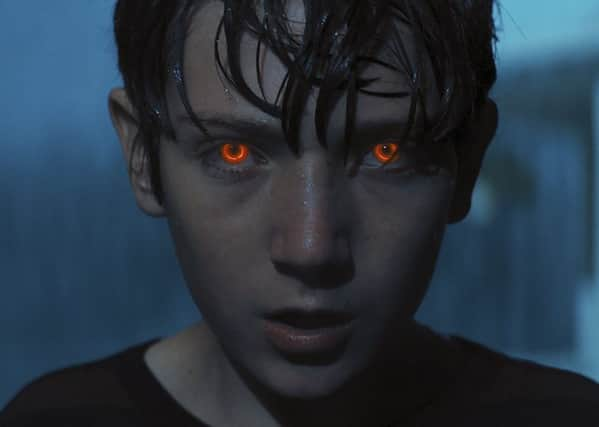Film reviews: Brightburn | Diego Maradona | Prophecy | We the Animals


Brightburn (15) **
Diego Maradona (12A) ***
Prophecy (15) ****
We the Animals (15) **
Imagine if Superman was born bad. That’s the starting point for new comic book movie Brightburn. Unfortunately this also appears to be as far as the filmmaking team – led by producer James Gunn – got when they made it. Though not affiliated with Superman or DC comics, it follows the Superman creation myth so closely – alien baby, fictional Kansas setting, adoptive farmer parents, kryptonite-style vulnerability – that simply inverting the outcome transforms it into little more than a cynical, nihilistic parody of the character’s early years.
That’s a shame because there’s a lot of deliciously nasty potential here, especially in the opening act, which sees doing-their-best parents Tori and Kyle Breyer (Elizabeth Banks and David Denman) starting to notice the disturbing ways their oblivious 12-year-old son Brandon (Jackson A Dunn) seems to be changing as puberty collides head on with his alien origins. Good people gradually realising their “special” child is the Devil not Jesus has been a common theme in horror movies since The Omen, of course, but the destructive capability of superpowers makes this an especially potent trope for a comic book movie universe; it’s certainly one ripe for exploration.
Advertisement
Hide AdAlas, that’s also what makes this film so frustrating. When Brandon fixates on a girl in his class, his super-powered intensity ensures he goes from sweet to stalker to psycho in record time, but beyond a few similar “creepy kid” moments, the film doesn’t follow through on its own narrative and thematic possibilities in any meaningful way. Instead, it’s more interested in revelling in graphically violent scenes of Brandon taking eye-watering (and jaw-mangling) retribution on anyone who threatens to get in his way.
Gunn (better known as the director of the Guardians of the Galaxy movies) comes from an exploitation movie background, so a certain amount of punky disreputability was to be expected in a film that doesn’t have to hook in a family audience. But Brightburn – which was written by Gunn’s brother, Brian, and their cousin Mark Gunn and directed by frequent collaborator David Yarovesky – manages to blow even its own anti-authoritarian stance thanks to a lame, end-credits attempt to set up this up as a viable franchise incorporating Gunn’s rubbish 2010 film Super.
Diego Maradona sees Senna and Amy director Asif Kapadi return with another meticulously researched archival documentary exploration of yet another misunderstood legend. Best remembered in the UK for helping deny England a place in the 1986 World Cup final with his infamous “Hand of God” assisted goal, the Argentine footballer’s demons are more deep-rooted than a spot of cheating. Tracing his rise from the slums of Buenos Aires to his position as the greatest footballer since Pelé (who’s seen at one point opining – accurately as it turns out – that the young Maradona doesn’t have the temperament to cope with what’s about to happen to him), the film zeroes in on his spectacular fall from grace, locating the cause not just in his own vices (he was a cocaine addict) but in his complicated relationship with Italian football.
Maradona built his professional career playing for Napoli, where his profile and talent helped transform the struggling team into Italian champions. Consequently, he was treated like a god, his talent making him untouchable, able to fraternise with the Camaro and the political establishment alike. But when he helped Argentina knock the national team out of the 1990 Italian World Cup, the host country took it as an affront and suddenly his protected status disappeared, leading to subsequent, very serious brushes with the law and the tax man. The film features new interviews with Maradona and his family, as well a wealth of footage from the time and the usual round of expert commentators. If it doesn’t have quite the same narrative oomph of Kapadia’s previous docs on similar subjects, it does make another compelling case for a more empathetic treatment of young superstars in the making.
Prophecy offers a fascinating look at the work and life of Scottish artist Peter Howson by observing him as creates the eponymous painting: a large scale apocalyptic work inspired by a vision he’d had of the Gates of Hell. It’s a simple but effective approach: on the one hand we get a close-up view of the hard graft and agonising decision-making involved in the creative process; on the other hand, candid interviews carried out in his Glasgow studio while he’s working provide illuminating insights into how his life, his family, his mental health struggles (he has Asperger’s) and the world at large intersect with what ends up on the canvas. Howson’s distinctive style isn’t to everyone’s taste, but the thought process behind it and the technique involved bringing it to fruition is undeniable.
A big hit on the festival circuit, We the Animals is a little too indebted to Beasts of the Southern Wild, The Florida Project, Moonlight and every Terrence Malick film of the last 20 years to really distinguish itself as something other than another faux-artsy coming-of-age indie movie. Shot in grainy 16mm and featuring snatches of elliptical voiceover and flashes of magic realism, its tale of a biracial kid (Evan Rolando) coming to terms with his sexuality as his parents’ tempestuous relationship falls apart only just holds together as a story, carried along as it is by the uninhibited performances of the non-professional Rolando and – as his feral brothers – Isaiah Kristian and Josiah Gabriel. If Netflix algorithms were used to create films for Sundance, this would be the result.